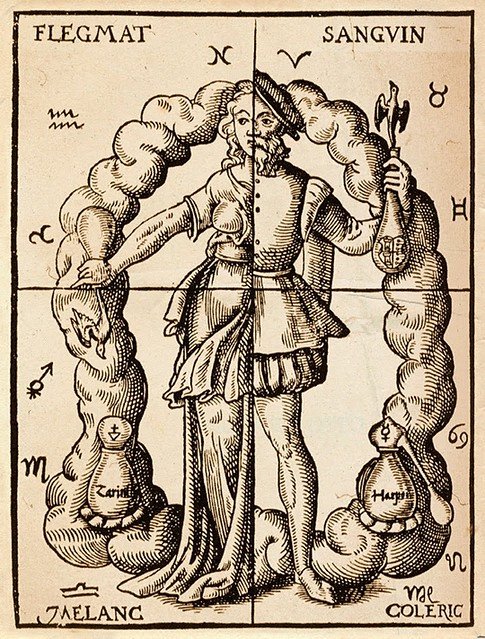The Ancient Theory of Humors: A Historical Perspective on Early Medical Beliefs
The concept of humors has been a recurring theme in many of my previous posts when discussing illness and the evolution of modern medicine. Bloodletting, emetics, leeching, and various other age-old medical practices are firmly rooted in the ancient theory of humors.
The four humors would take into consideration blood, phlegm, black bile and yellow bile, and they were meant to be in balance, and when they were not in balance, these would be a problem leading to being sick. This was a theory that doctors used a lot at that time and I do not know if I should say it worked or not. If a person had too much blood, a hole will be poked into the body of the person to leak out blood from the person, and so on.
The question arises: How did this theory come into being, and why did it persist for so long, even though it was based on limited empirical evidence?
At one point or the other, there was a form a faith healing in the past. The case where your doctor was also your priest. This was common in ancient Egypt, and other part of the ancient world. While this went on for a very long time, soon, philosophers wanted to start explaining things according to what they could see and not what they could not see. They were not looking at theories and hypothesis yet, but being able to differentiate natural and supernatural was important.
By the 6th century BCE, scholars in Ancient Greece were already looking at the elements that made the earth such as fire, water, air, and earth which was proposed by Empedocles. These elements had their properties as some were hot, others, cold, wet, or dry. he talked about water opposing fire and wind opposing earth. This application was also tried on human and it showed that there were four humors. With each of the elements having the properties of the humors such as phlegm being the humor of water, which is cold and wet, blood being the humor for air, which was hot and wet, black bile was cold and dry which was associated with earth, and yellow bile was hot and dry and was associated with fire.
While it was believed that everyone had a balanced state of humors which made healthy, they could be unhealthy there was an imbalance which could be affected by weather, exercise or activities, and diets.

https://www.flickr.com
While the Greeks emphasized four elements, Indian Ayurveda recognized five elements, with the fifth being Ether, and the human body was seen as composed of vata, pitta, and kapha. In China, Wuxing delved into the concept of Qi, an energy flowing through the universe, along with the five elements: water, wood, metal, earth, and fire. Moreover, they acknowledged opposing properties, yin and yang. Different humoral systems existed in various regions, but the Greek system, largely due to the influence of Hippocrates of Kos, gained wide recognition.
According to the Hippocratic Corpus which was a group of work documented by Hippocrates and his disciples, lots of diseases were attributed to the four humors. It was believed that pneumonia was caused by too much phlegm, while cancer was caused by too much black bile. Hippocrates also believed that food were also made of humors as they had different properties. They believed that the liver turned food to chyle after eaten and turned it to humors. It was believed that after the breaking down the humors are mixed together to become blood while pneuma was air that flowed through the arteries. It was believed that every food you ate determines your humor.
If the disease of a person was caused by too much blood, it made sense to poke a hole in the veins to let out blood, and it was caused by too much bile, giving diuretic would suffice, and other diseases had to do with food balancing. The foods were then compiled into books such as the one that was compiled in Dioscoridis's book titled Materia Medica but then other factors such as environment were not neglected such as cases where hot weather increased yellow bile which caused diseases such as dysentery, diarrhea, and malaria.
Notably, scholars like Claudius Galen built upon these ideas. He acknowledged that blood, rather than air, circulated in the arteries, although he remained an ardent supporter of humoral theory. He even extended humoral theory into the realm of psychology, asserting that humors were responsible for a person's mood and personality. According to Galen, excess anxiety could lead to an increase in black bile, resulting in a melancholic disposition, while an abundance of blood would induce a sanguine temperament. Excess yellow bile could make a person choleric, and an oversupply of phlegm might render one phlegmatic.
The theory of humors, rooted in ancient medical beliefs, profoundly influenced medical practice, and was used for scholar even in the Islamic golden age where it was kept in the Bayt al-Hikma in Baghdad and this understanding was used for centuries, so it was a big part of both academic culture. While it may seem outdated and medically unsound in the context of modern science, it serves as a valuable testament to the evolution of medical knowledge, representing an essential step in the fascinating journey of human understanding of health and illness.
Reference
https://iep.utm.edu/empedocles/
https://mathshistory.st-andrews.ac.uk/Biographies/Empedocles/
https://www.ncbi.nlm.nih.gov/pmc/articles/PMC4719489/
https://iep.utm.edu/wuxing/
https://philarchive.org/archive/MORFFT-4
https://www.loc.gov/item/2021666851/
https://web.pdx.edu/~blewi2/341/Temperaments/
https://study.com/learn/lesson/the-four-humors-blood-phlegm-black-bile-yellow-bile.html
https://www.thecolourworks.com/hippocrates-galen-the-four-humours/
https://www.jstor.org/stable/25802633
https://www.ncbi.nlm.nih.gov/pmc/articles/PMC3066781/


Thanks for your contribution to the STEMsocial community. Feel free to join us on discord to get to know the rest of us!
Please consider delegating to the @stemsocial account (85% of the curation rewards are returned).
Thanks for including @stemsocial as a beneficiary, which gives you stronger support.